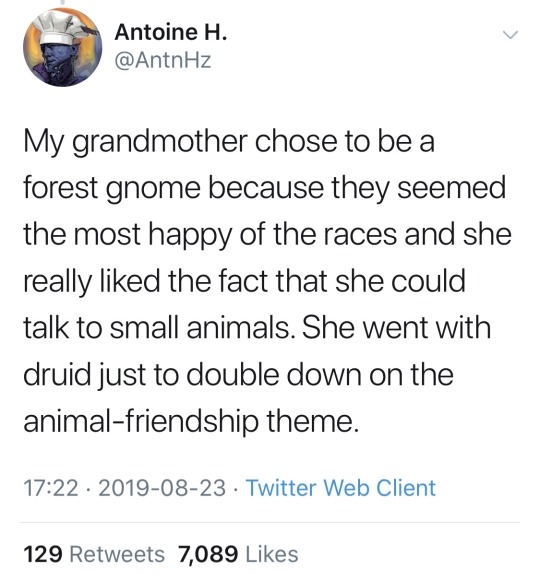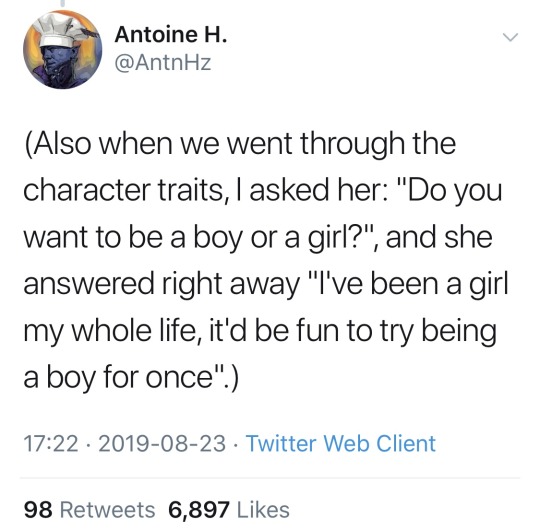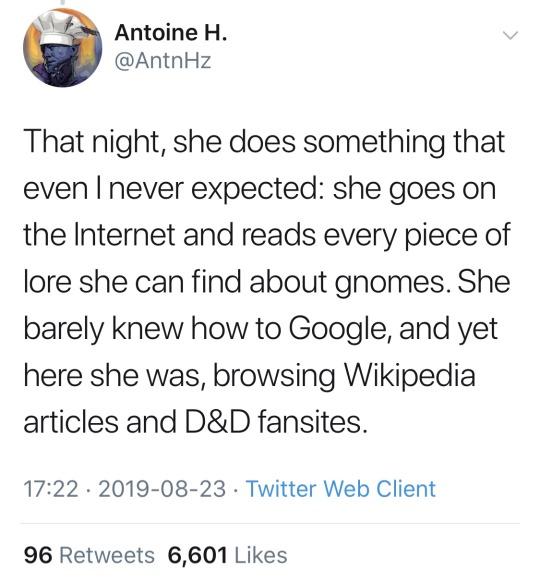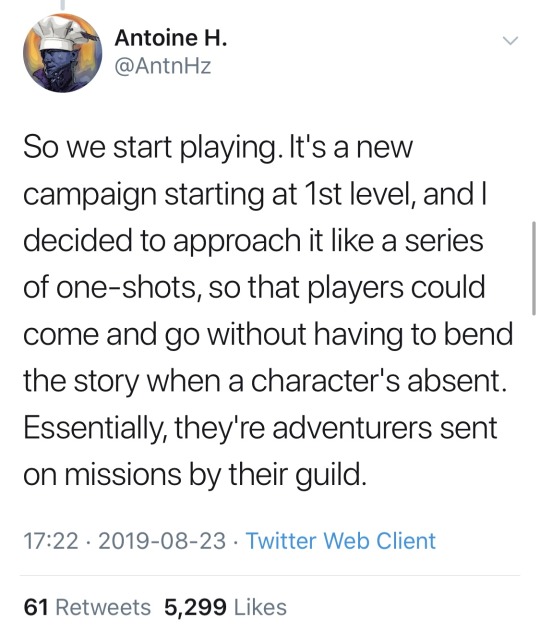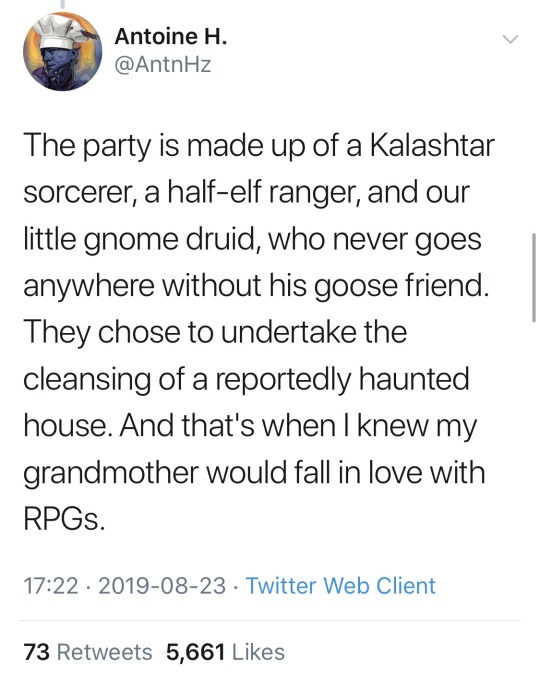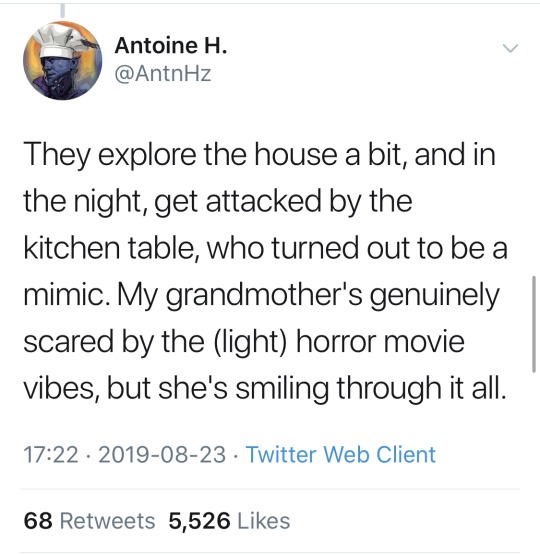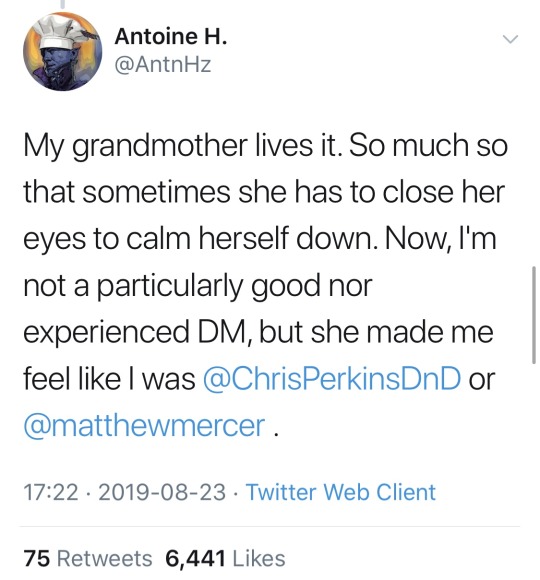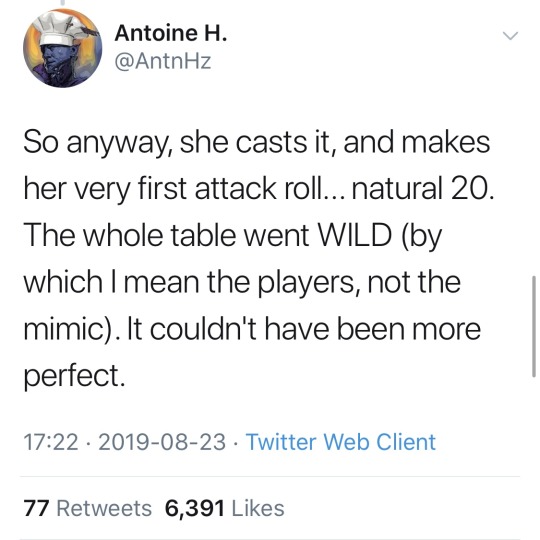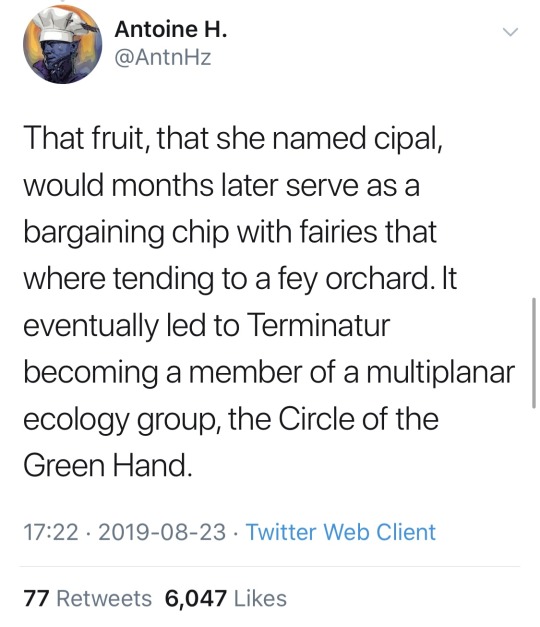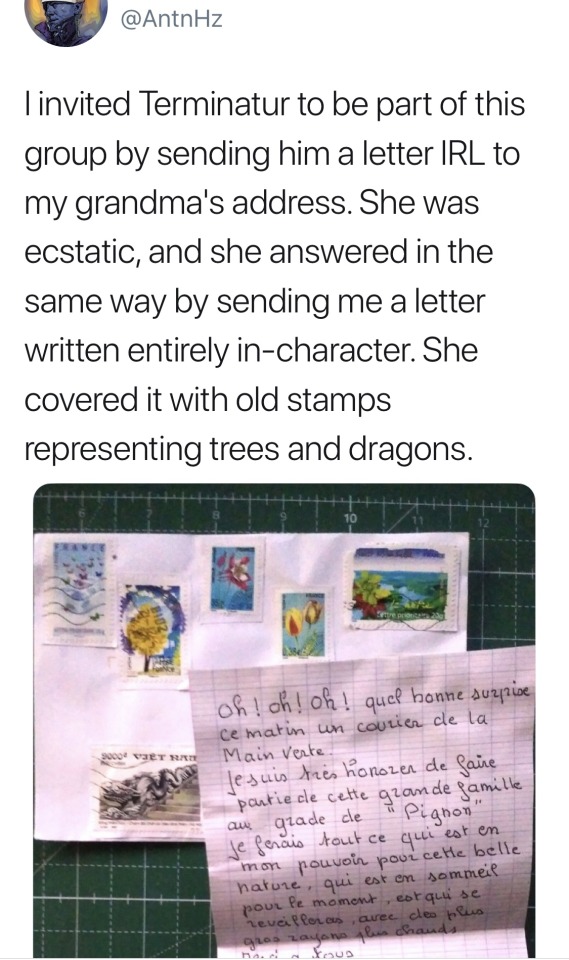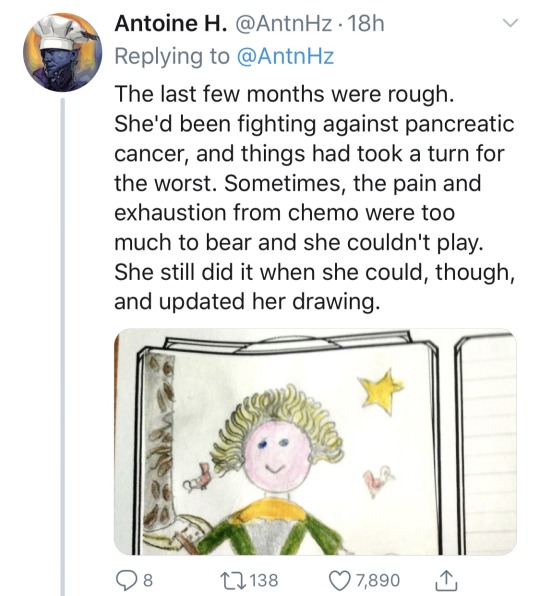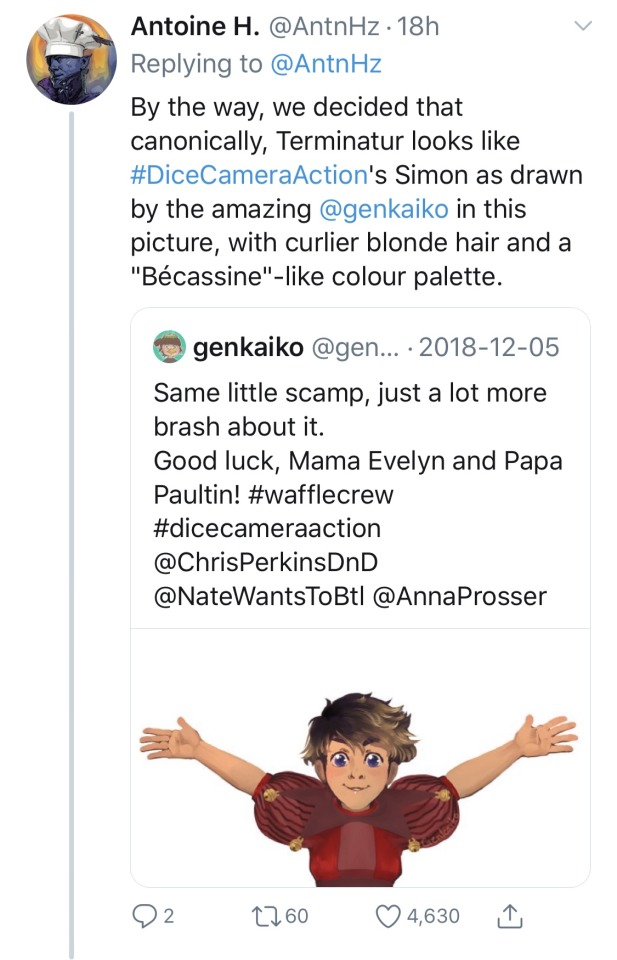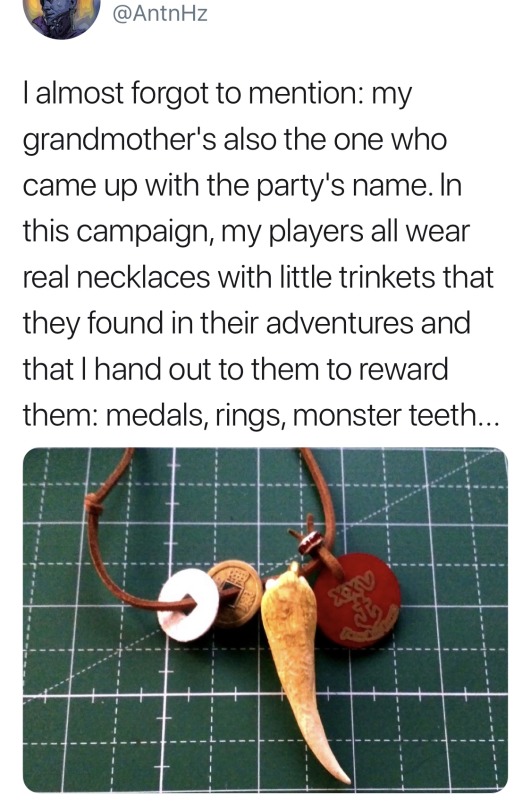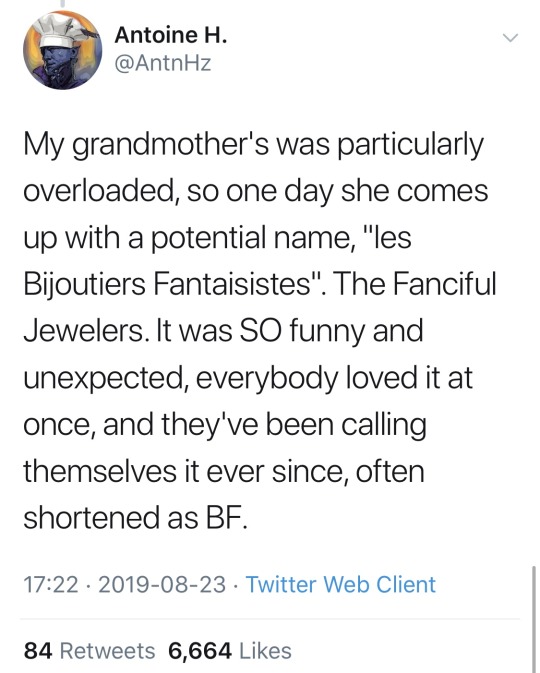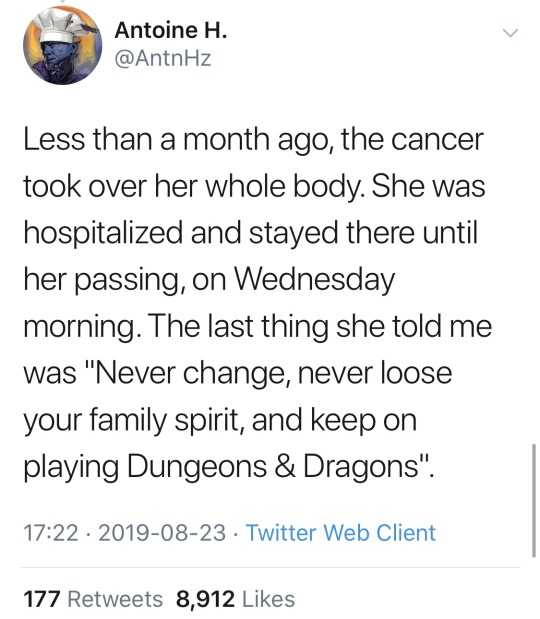Text

Elrond: Let's maybe not swear a binding oath to keep jewelry away from an Ainu at all cost. Let's maybe. Let's maybe just like, pinky promise to do our best. Trust me on this, you don't want to swear any oaths
7K notes
·
View notes
Text
disturbed by how little ppl acknowledge the secondary health risks of vampire bites. if your vampire lover is drinking your blood you MUST be up to date on your tetanus shot. puncture wounds are at especially high risk for tetanus infections. just because your partner was born in 1312 doesn’t mean you have to die like it.
moreover they should be prepping the bite point with an alcohol wipe.
and while I’m at it, I’ve noticed a blithe disregard for health & safety when it comes to blood pacts. can’t believe I have to say this but you should absolutely NOT be cutting your palm open with the pocket knife from your belt holster (??????)
if you’re expecting to be in a blood pact/oath situation please just pick up some sterile finger lancets from the pharmacy. cannot stress this all enough.
21K notes
·
View notes
Text
Alright kids, time for more science. Let's see if this shakes things up a bit more than the last one. Welcome to the 90s, and Advanced Dungeons & Dragons 2nd Edition. There are again several ways to generate your ability scores. A major difference from 1st Edition is that some of these are just obviously more powerful than others.
Method I: 3d6 straight down the line. The books devote a weird amount of page space justifying this one. Best not to go into character generation with any preconceptions about what you'll play.
Method II: A slight upgrade from Method I, you roll 3d6 twice for each ability, keeping the highest total. You're mostly still letting the dice choose your character for you.
Method III: 3d6, but now you get to arrange them! You have more control over what you'll play, but good luck getting into the "elite" ones like paladin.
Method IV: 3d6 twelve times, pick the six highest and arrange as you like. Someone else will have to do the math on how this compares to the next one.
Method V: Again we have today's standard method, 4d6 (drop lowest) arranged as you please. Will it dominate the poll again?
Method VI: Now we're getting into almost the realm of point-buy. You start each ability at 8, then roll 7d6 and assign the results to your ability scores as you choose. You can't go over 18, though! So unless you rolled two 5's or a 4 and a 6, you can't have that hallowed number.
Player's Option: Skills & Powers added a bunch of new ones later.
Method VII: Point-buy is here. You have 75 points to spread between your abilities, making sure none are below 3 or above 8, and are within the limits of whatever race and class you've picked.
Method VIII: You get 24d6 to assign among your ability scores, no less than 3d6 and no more than 6d6 to each ability. Than you roll them and keep the three highest of each roll. This allows you to go for a certain class but doesn't guarantee it.
Method IX: Point-buy but with variability. You first roll on a table to see how many points you have to spend, but also what your maximum score is. Higher point totals allow for lower maximums!
Method X: This is just Method VII but it calls the points character points and allows warriors to spend points to get exceptional Strength. I'm really not sure what the point of it is unless you're playing a warrior class, and even then I might use VII and just hope for a good roll on exceptional Strength.
9 notes
·
View notes
Text
New Release: Godslingers!

I've just released Godslingers! It's game for telling the stories of cosmic cowboys who have the power of dead gods locked and loaded in their weapons. The weapons will one day consume them entirely, but for now each of these interstellar desperados can't let go.

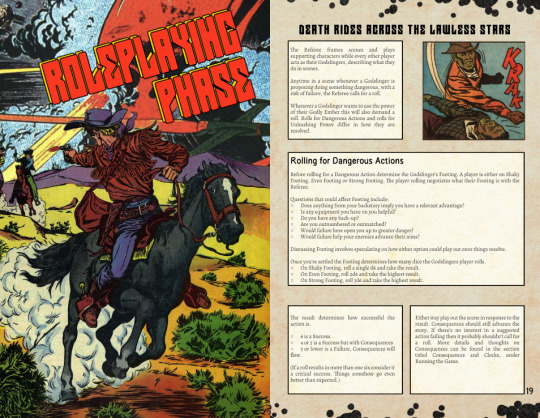
Comes with rules for inventing the Old Dead Gods in a storytelling phase, mechanics that support dramatic character arcs and tense showdowns, as well as an introductory adventure and lots of stuff on running the game.
You can also grab Godslingers along with Old Gods & Young Guns and Thirty Foes OR Once again, we are defeated in a bundle for a tenner discount for the rest of the month. They're three stand alone books that share a wider world.
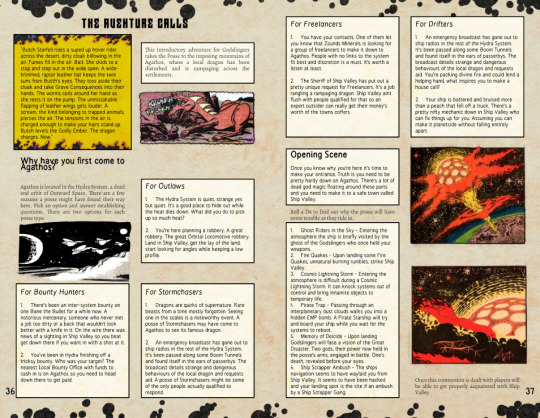
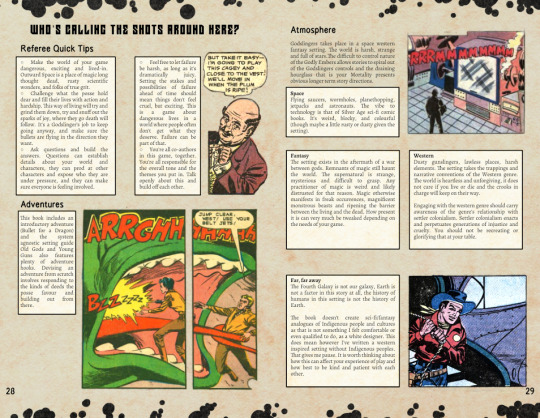
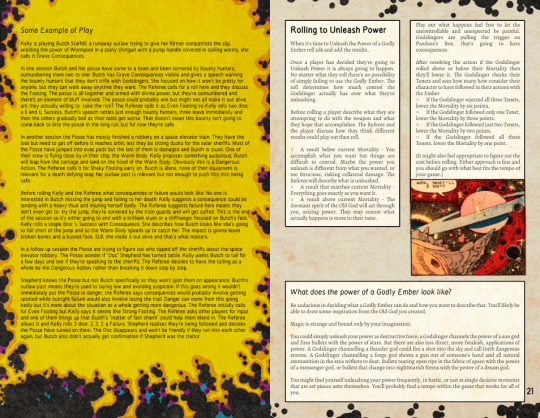
76 notes
·
View notes
Text
Have you played FUSION ?
By Palle Schmidt & Malik Hyltoft

Set in an alternative reality in the future year of 2012 (as imagined by someone in the nineties.) Fusion lets you play as hard boiled detectives in smalltown Denmark.
23 notes
·
View notes
Text
God, I love dungeons and I love dragons. If only there was some system out there that would let me combine these two passions :(
1K notes
·
View notes
Text
CLASH! Crowdfunding is Live!
It's finally here - the campaign has launched, and there's some stuff I didn't tell you about! There are eight versions of the top tier pledge, Otaku - one for each Fighter playbook. When you pledge at one of those tiers, you pay for a special mini-manga featuring a little story, starring the Fighter you picked.
The campaign runs from now until the end of June, so there's plenty of time to check it out and pledge.
If you're looking to support me but want something sooner than the launch of the game, I'm also running a sale on every game in my library! Any individual title is 30% off, and you can get a bundle of every one of my games for 50% off the total price. This sale also runs until the end of June.
In the spirit of the occasion, I've also set up my ko-fi! If you like, you can toss me a tip or become a monthly member. I'm not selling anything there - this is just for anyone who wants to buy me a coffee.
70 notes
·
View notes
Text

i have been waiting all game to write the cataphracts
i hope at this point the reader realizes the stat blocks are perhaps unreliably narrated
16 notes
·
View notes
Text
While prep work continues for the upcoming faire season, I came across a few location test shots of Rae I before a long weekend of festivities last year.
That golden hour never gets old.
I can't wait to swing steel again soon. ^^
Wishing you all a great weekend.
324 notes
·
View notes
Text
girl im going insane over characters you didnt even know existed
9K notes
·
View notes
Text
Exclusive: Discworld TTRPG in the works by studio behind Fallout wargames
Modiphius, the studio responsible for tabletop adaptations of Star Trek, Fallout, and more, is working on a Discworld TTRPG.
Having secured the rights to the beloved series with an agreement from the late author Sir Terry Pratchett's estate, Modiphius is already at work on a Discworld roleplaying game "around the city of Ankh-Morpork and the wider Disc." This will hit Kickstarter later in the year.
Read more here.
764 notes
·
View notes
Text
Lots of cute girls are into Rolemaster these days
91 notes
·
View notes
Text
Creature Idea: A moray eel with horse legs. Runs down rabbits and pheasants and such, and can stick its neck into burrows to grab prairie dogs. Its body is still noodly and flexible though, and it rarely attacks anything as big as a human.
38 notes
·
View notes
Text
Fantasy Bank / Insurance / Etc. (blog post, free, always + booklet, few dollars, if you want it printed)
Netherworld Post operates in cycles -- "write" / "art" / "do business." The business kinda stretches into a continuous loop these days (hi we're open), and I'm having to recalibrate how I think about things.

Moving on to the point.
I'm about to enter a "write + business" cycle and and my business is SIGNIFICANTLY different these days than when I originally came up with it.
So
We are going to the polls!

This would be offered in two forms, if it launches:
Blog posts. Free. ALWAYS FREE. No pay wall, no log in, just a good ol' blog post series. "Here is how you can make a bank for your RPG. Here is how you can..."
Booklet, a few bucks. The blog post in printed / formatted form. This is in addition to, not replacing, the blog posts. It's for "I want to bring this to a table and not read a blog on my phone, I want to make notes on paper."
To be clear and explicit THIS IS NOT A REAL WORLD FINANCIAL PRODUCT.
IT IS NOT FINANCIAL ADVICE.
IT IS PURE FANTASY. NOT TO BE USED FOR ANYTHING OTHER THAN ENTERTAINMENT.
MY LAWYER IS EXPENSIVE.

Sorry.
I am inundated regularly with "hey you should launch a fantasy blockchain thing to take advantage of" and I just. Want to scream. Okay that's a rant for another time.
Lawyer if you are reading this I love working with you(r skills) and you're worth every penny (genuine).

This would be game-independent, not based on any specific game. Just a general toolkit to write about a bank (etc.) / use in your game.
There will be optional variants included -- "This is how you can do a crooked bank that robs everyone. This is how you can do a paladin-bank who is Very Lawful. This is how you could..."
I'm asking for a check on interest because this would be a very large project to tackle for each -- bank, insurance, etc. -- and while a lot of fun, I don't want to explore if it's too real for fantasy.
Let me know!
Thanks!

36 notes
·
View notes
Text
Hello, Initiate. Welcome to the Path. I know you have a lot of questions, but please save them for later. We haven't much time. It's imperative that we begin immediately.
The first step on the Path is the Construction of the Divided. You have to tell me how, Initiate. Look into your heart of hearts and tell me...
8 notes
·
View notes
Text
RaR Musings #17: Simulation in Games
I got into it lately on the merits of game design, and definitions of mechanical tropes like roguelike and roguelite, and whether rpg, jrpg, RP game, and roleplaying game all had different feels, and if a game like Alan Wake counts as an rpg or not. (To be clear: If a game has you play as a character, who makes decisions as a cross reference between that character's identity and the environment and challenges at hand, in a way that defines the character or changes them in some way, it's a roleplaying game. This means that just about every product people recognize as a 'game' released in the last 30 years is, likely, a roleplaying game, in some way, because it turns out, people like when you attach narratives to things.)
Roguelikes have existed for years, but really came into their own in the last decade, because the promise of an enjoyable, if difficult, gameplay loop that rewards player skill and requires significantly less brute-force design work by the developer. It means you can have a lot MORE game, with a lot more playtime, for less, relative to a game where every dungeon is hand-crafted and every enemy and item intentionally placed. But, because the game throws the entire catalogue at you from the get-go, there's an enormous learning curve, and without a sense of progression, many get bored or frustrated. Rogue-lites took the idea of the roguelike, and made it more consumer friendly, enabling progression over time, but still with major losses from death in randomly-generated environments.
Tabletop games follow these concepts as well. In a ttrpg, a host player meticulously crafts a dungeon, placing enemies and items; an enormous amount of work, and without a library of pre-built campaigns, one that leads to DM burnout sooner or later. Some games provide randomly generated tables, but having to reference tables and subtables doesn't feel very fun; that's computer work. Other games try for a mix of the two, with a host that helps ensure content is distributed smoothly, but the game is mostly running by itself, and so there's less work on the host's shoulders.
In each of these cases, there's different degrees of Simulation: a natural follow-through, where Action A, produces Result B, but that in turn, leads to Result C, and so on, but sometimes, a host is responsible for deciding what the Result is, forcing Action themselves or by presenting a scenario to another player, or stopping the Result chain for narrative or balance reasons. Often, a computer is designated the host, and it's ability to make these determinations are a simulation in itself, based on random number generation, weighted by the designers of the game. It's the main reason why a game like Baldur's Gate 3 can have up to four players, and none of them are actively causing the game to function, or even just one player, who controls multiple characters, but still doesn't cause the game to exist.
But tabletop roleplaying game enthusiasts are shy of this. They want to feel immersed, that their game and world and characters are real; they don't want to know that it's random, or that the DM just decided something arbitrarily, or made it up. They don't want to see how the sausage is made, because somehow it's less impressive if it's the result of hard work, and not effortlessly conjured to your dinner plate. It's also this distinction that spooks most players out of ever evolving into a dungeon master themselves: they worry that they need to have somehow ascended to become brain-kin with the fantasy world and master all it's mechanics and intricacies, to memorize statblocks and enemy and item locations, maps and lore and and And and. The revelation that a lot of the time it was made up on the spot disgusts them, because it threatens the immersion.
I muse about this because I'd set out to make Road and Ruin explicitly playable with no dungeon master. Host responsibility is shared around the table, either together, or passed to the next. A certain amount of simulation is required, then, to make sure the game actually functions, but the notion that each player would be responsible for taking turns coming up with what happens next disgusts and horrifies people. They want to feel immersed, not be taken out of it, and they want to guess what happens next and be proven right, not make up what happens next and then it just does. But in all the "the DM is a player too! :)" arguments I've ever seen, never have I ever heard anyone acknowledge that these benefits of immersion and not knowing what happens next extend exclusively to the adventurers, and never to the DM themselves. Sure, players can do things that the DM didn't anticipate, but that means work rather than discovery, as the DM scrambles to make up what happens next, not merely just guessing and being proven right.
Road and Ruin has been described as (read: accused of) being a game that only dungeon masters can play, because only dungeon masters are versed in the techniques being employed here. Which is a really interesting argument, because, like... why do games like DND build their entire functionality around the existence of these supposedly rare people? While it's true that not everyone is an artist or designer, or versed in fantasy or storytelling tropes, why is it the only concrete way for players like this to get to PLAY a game is to rely on a computer to take the reins from them? That a DM can be a player, but that a player can't be a DM?
If nothing else, I'd want Road and Ruin to have enough simulation elements that I, myself, could be a player in the game, WHILE being the host. That I could generate the story as I go, and be proven WRONG, make mistakes, and die, not just spend tens of hours lovingly crafting a narrative and building a world, only for everyone to trample it and litter, climbing aboard the magical mystery tour, expecting to be trucked from one narrative moment to the next. That I could show, by example, how exciting it is to come up with plans, and the twist of being proven wrong, and that other players might be emboldened by it to the point of wanting to try it for themselves. And finding, it's not actually so different from how they were playing before.
I still struggle with reducing the amount of math baked into the simulation, and make it more about player choice, but I also have to have systems where Something Happens, regardless of where the players are and if they're doing anything to provoke it. Realizing you've dropped your wallet somewhere after you've been travelling for hours, making the choice to look for it, meeting someone who found it, and getting to learn about who they are and what they're doing there, or finding a hidden cache of treasure, but it's too much for you to carry by yourself, certainly without notice, are both things I made up on the spot based on the same [GOLD] card, out of a deck of 52 cards, but with a diceroll determining the event was "Bad, but resolved", and "Good, but at a cost". If the game needs someone like me to be able to come up with those conclusions as the game master, then by all means, I'll do it, but as a player, I had no idea those events were going to occur, and I'll be just as capable of making decisions about what to do about them as everyone else at the table.
9 notes
·
View notes


